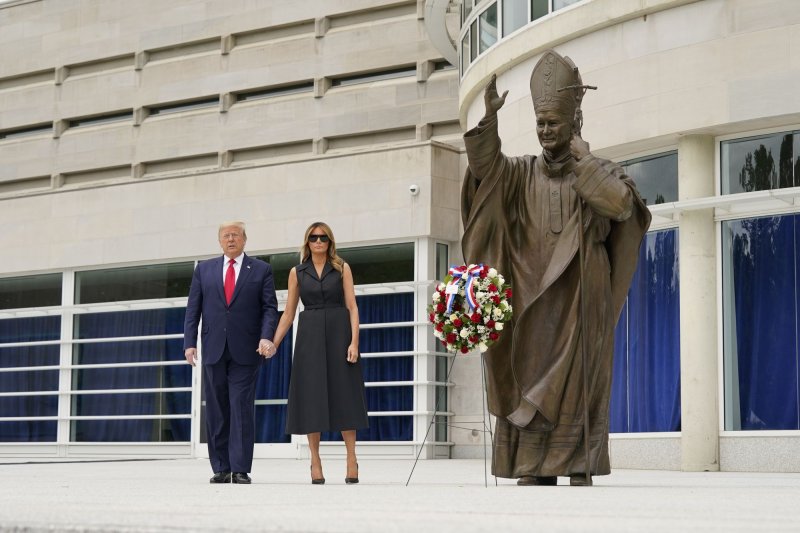1 of 4 | President Donald Trump and the first lady, Melania Trump, visit Saint John Paul II National Shrine in Washington, D.C., on Tuesday. Photo by Chris Kleponis/UPI |
License Photo
June 3 (UPI) -- President Donald Trump has signed an executive order to allot at least $50 million a year for programs that advance international religious freedoms while being chastised at home by religious leaders and politicians over controversial visits to a Catholic shrine and an Episcopal church.
The president quietly signed the executive order Tuesday after visiting the Saint John Paul II National Shrine -- a visit that was criticized by the archbishop of Washington, D.C., who said the shrine's namesake would not condone the use of tear gas to disperse peaceful protesters from a religious facility.
Trump was also rebuked by Democrats and some Republicans after police cleared protesters from a park near the White House Monday evening so he could pose for photographs holding a Bible in front of St. John's Episcopal Church, which had been set ablaze during demonstrations spurred by the death of George Floyd while in police custody.
"I find it baffling and reprehensible that any Catholic facility would allow itself to be so egregiously misused and manipulated in a fashion that violates our religious principles, which call us to defend the rights of all people, even those with whom we might disagree," Washington Archbishop Wilton D. Gregory said Tuesday in a statement.
After the photos were taken in front of St. John's, Bishop Mariann Edgar Budde of the Episcopal Bishop of Washington, D.C., said Trump had "sanctioned the use of tear gas" to clear the churchyard to use it as "a backdrop for a message antithetical to the teachings of Jesus and everything that our church stands for."
"The Bible teaches us to love God and our neighbor; that all people are beloved children of God; that we are to do justice and love kindness," she tweeted. "The president used our sacred text as a symbol of division."
On Tuesday, the president visited the Catholic shrine with the first lady, Melania Trump, where they laid a wreath at the base of a statue of Saint John Paul II and observed a moment of silence before entering the building.
Kellyanne Conway, White House counselor, later explained to reporters that Trump did not orchestrate his movements to St. John's and defended his actions, stating Tuesday's executive order is part of "a continuum" of defending religious rights at home and abroad.
"I think it is very unfortunate that people of faith would call into question what is in anyone's heart, including the president's, what compelled him to go over to St. John's and hold up his Bible," she said. "The politicization of that by people of faith is very unfortunate."
The executive order instructs the State Department and the U.S. Agency for International Development to devise a plan to prioritize international religious freedom in U.S. foreign policy while earmarking $50 million per year for programs that "anticipate, prevent and respond to attacks against individuals and groups on the basis of their religion."
It also directs the Treasury Department to develop "economic tools" to advance religious freedom in countries of particular concern, including those on a special watch list.
The U.S. Commission on International Religious Freedom "welcomed" the executive order for elevating religious freedom in its foreign policy.
"We applaud President Trump for continuing to prioritize religious freedom as a national security imperative and a foreign policy priority," USCIRF Chair Tony Perkins said in a statement. "The executive order encourages swift action by the U.S. government to hold accountable foreign governments that commit severe violations and substantially increases U.S. economic assistance to support programs that advance religious freedom around the world."















